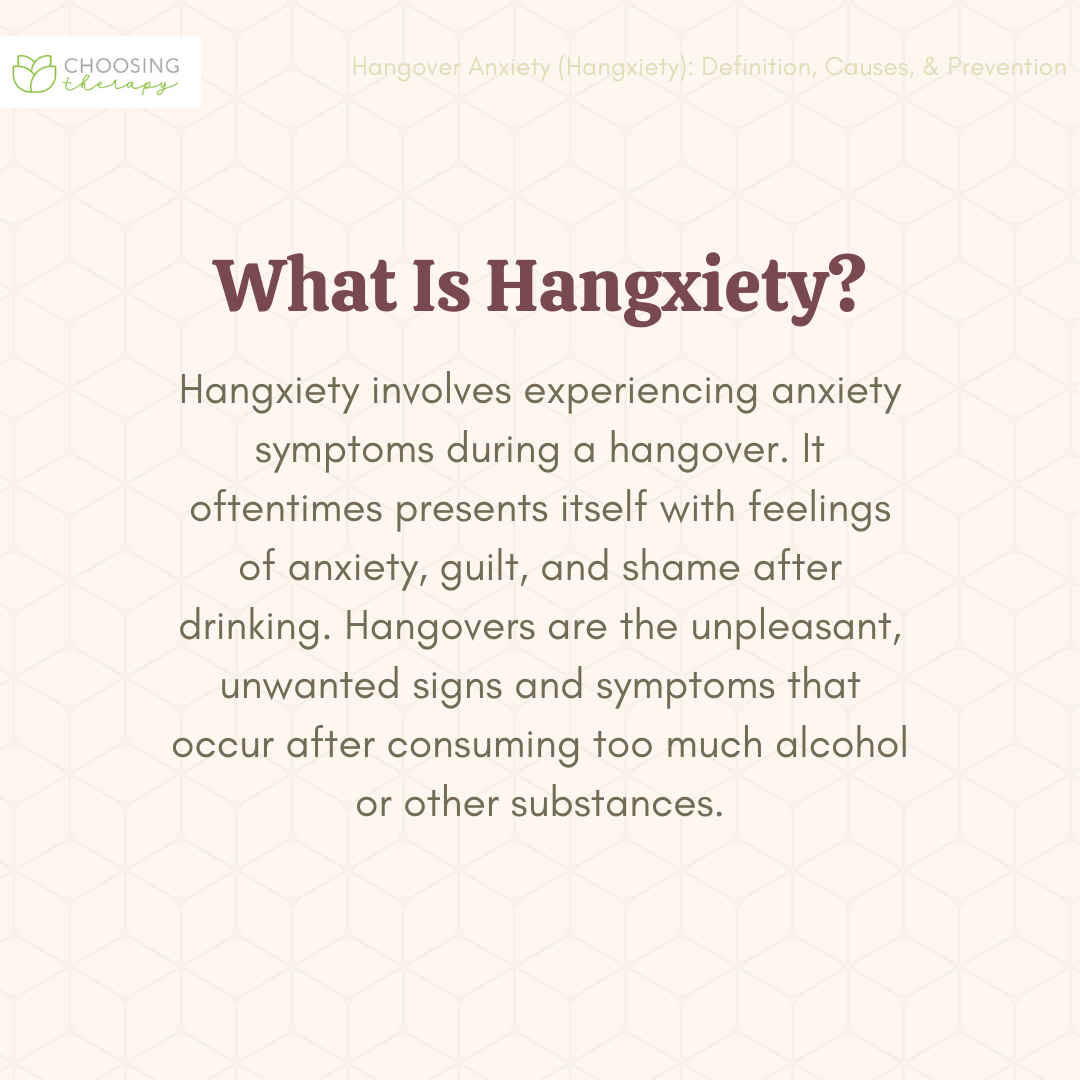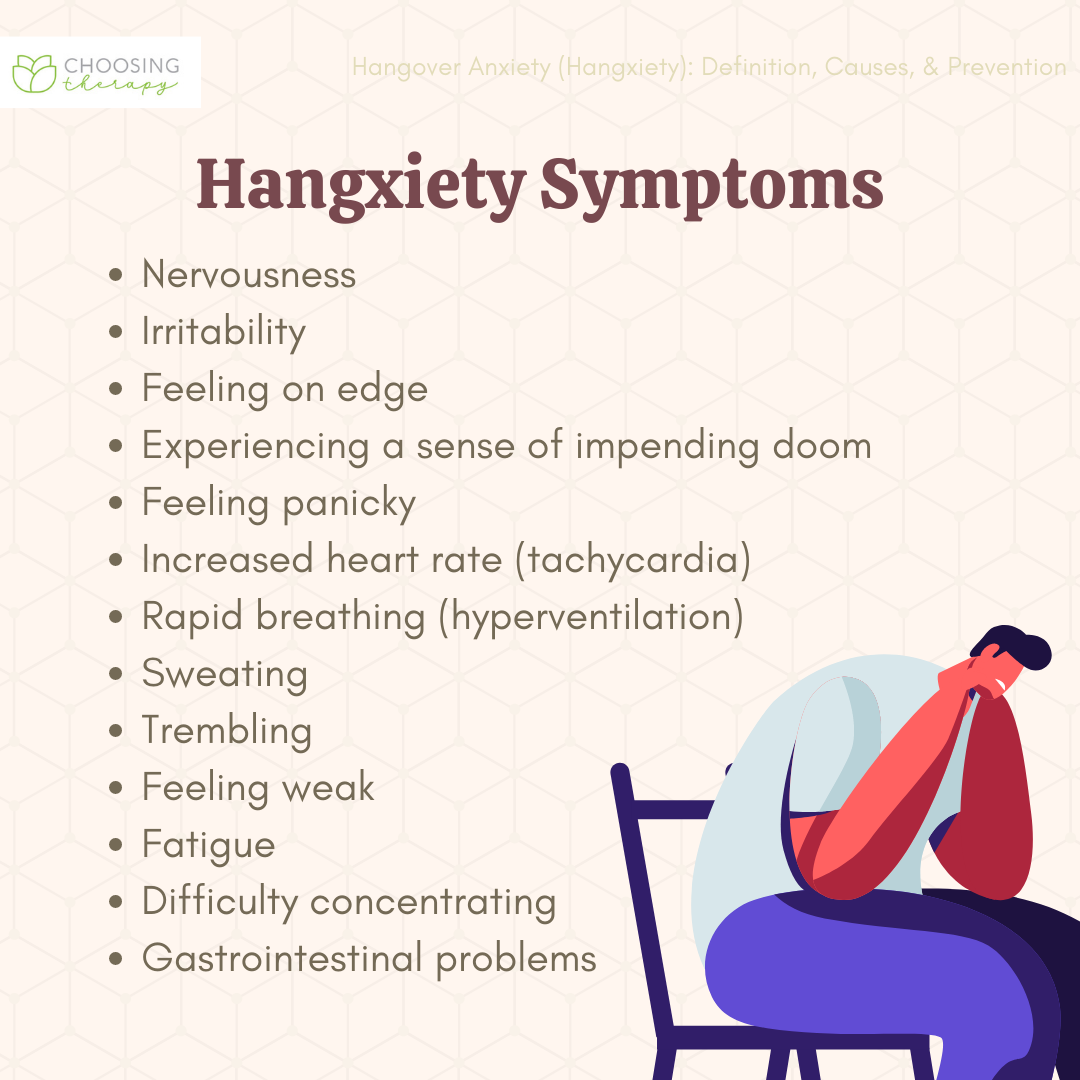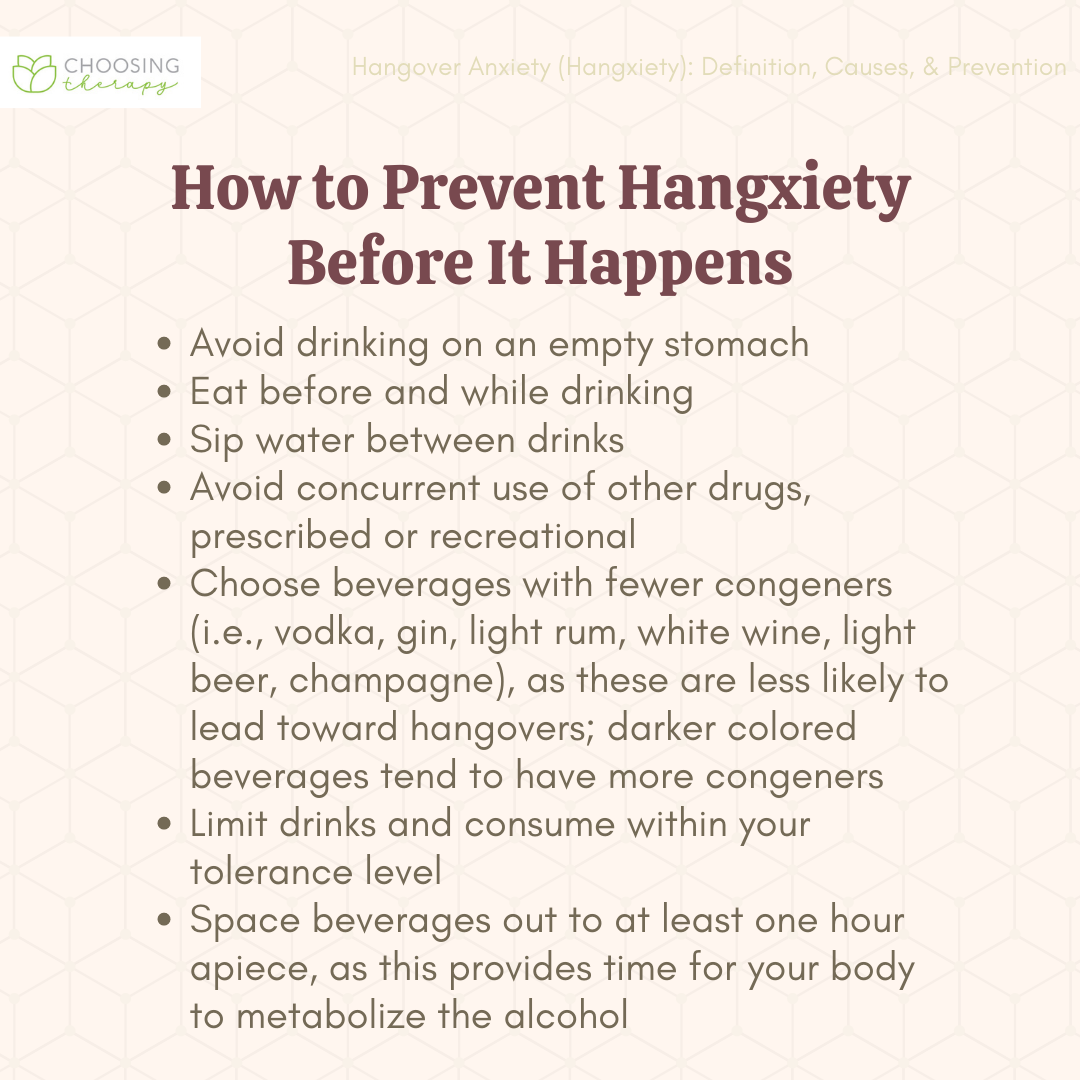Hangxiety is anxiety that occurs after drinking.1 Like normal anxiety, hangover anxiety results in mental and physical symptoms, such as worry, regret, sweating, and irritability. While there is no ‘cure’ for hangxiety, staying hydrated, avoiding substances, and setting limits can help you deal with symptoms.
Ria Health: Effective, Evidence-Based Alcohol Treatment 100% Online Quickly change your relationship to alcohol with our at-home program. On average, Ria Health members reduce their BAC levels by 50% in 3 months in the program. Services are covered by many major health plans. Visit Ria Health
What Is Hangxiety?
Hangxiety (hangover anxiety) is a non-diagnosable condition characterized by anxiety symptoms that may develop after a night of drinking, often presenting as guilt, shame, and regret.2 Hanxiety produces many typical anxiety symptoms, but only alcohol can trigger these experiences.
Symptoms of hangxiety may include:1
- Increased worry
- Paranoia
- Difficulty concentrating
- Rumination about past events
- Stomach aches
- Gastrointestinal issues
How Long Does Hangxiety Last?
The duration of hangxiety symptoms varies. Post-drinking anxiety may last anywhere from a few hours to an entire day based on the amount of alcohol consumed and tolerance level.1 If a person has consumed excessive quantities of a substance or has lower tolerance, the experience may last longer than 24 hours.
What Causes Hangxiety?
Many may ask, “Why do hangovers cause anxiety?” However, the answer may not be so simple. Hangxiety can stem from various factors, such as social anxiety, guilt, or inadequate sleep. These factors can produce the characteristic symptoms of hangover anxiety and, when combined, worsen the experience.
Possible causes of hangxiety include:
Brain Abnormalities
Research has identified a physiological link between the neurotransmitter gamma-aminobutyric acid (GABA) and alcohol. GABA inhibits judgment during active alcohol consumption, which may result in actions contributing to excessive anxiety, fear, panic, stress, and other negative emotions.3
Social Anxiety
Recent studies show that roughly 15 million adults in the United States struggle with social anxiety disorder.4 Some individuals with SAD may consume alcohol to feel comfortable in social situations, resulting in hangxiety if they cannot recall the events of their evenings. They may draw worst-case scenarios and doom-and-gloom conclusions.
Emotional Withdrawal
Once alcohol consumption ceases, chemical alterations occur in the brain as the brain works to reset itself. During this time, someone may experience emotional instability and withdrawal. Those experiencing emotional withdrawal may use maladaptive coping mechanisms (i.e., continuing to drink more) as an avoidant coping strategy.5 Unfortunately, this behavior only further intensifies and exacerbates hangxiety symptoms.
Alcohol Withdrawal
Alcohol withdrawal may contribute to hangxiety as symptoms typically include restlessness, worry, and confusion. These unpleasant experiences worsen discomfort and trigger increased anxiety after drinking, especially when withdrawal symptoms are combined.
Regret
Regret is a common cause of hangover anxiety. A person may worry about what was said or done the night before, and these thoughts accumulate as their uneasiness intensifies. Over time, people may internalize feelings of shame and believe they are inherently ‘bad.’6 Thoughts like, “I am a screw-up” or “I cannot do anything right” become the new internal negative self-talk, continuing the cycle of regret and guilt.
Poor Sleep
Although drinking may lead to blackouts, chemical processes within the brain compromise sleep quality. A late night of alcohol consumption also minimizes the time allotted for sleep. Staying up until 3:00 am drinking and waking up for work at 6:30 am becomes increasingly difficult over time (and with age), which can lead to additional hangxiety.
Low Alcohol Tolerance
Having a low tolerance for alcohol can contribute to bad anxiety after drinking due to the limited capacity of the body to metabolize and process alcohol effectively. The resulting rise in blood alcohol concentration can bring on symptoms of intoxication rather quickly and intensely, including anxiety. Secondary repercussions of intoxication, like socially inappropriate behavior, poor sleep, and interactions with medication, can also lead to hangxiety.
Medication Use
Alcohol interacts with several medications, including those commonly used to treat anxiety.7 In some cases, alcohol enhances the effects of prescriptions (e.g., the sedative effect of benzodiazepines) or interferes with efficacy. Whether you are taking prescription or over-the-counter medications (e.g., antihistamines), be sure to discuss with your healthcare provider any interactions with alcohol you should be aware of.
Folic Acid Deficiency
Chronic alcohol use can lead to deficient levels of folic acid (vitamin B9) because it reduces absorption, storage, and metabolism of the vitamin while increasing excretion, mostly in urine. Folic acid deficiency occurs in an estimated 80% of people with alcohol use disorder.8
In addition to many secondary medical consequences, mental health symptoms can also arise with folic acid deficiency. If you wonder, “Why do I get anxiety after drinking,” consider talking to your healthcare provider about the possibility of a folic acid deficiency.
Help for Alcohol Use Ria Health: Effective, Evidence-Based Alcohol Treatment 100% Online Quickly change your relationship to alcohol with our at-home program. On average, Ria Health members reduce their BAC levels by 50% in 3 months in the program. Services are covered by many major health plans. Visit Ria Health Recovery.com – Find the best local detox or rehab center covered by your insurance. Search our unbiased and thorough list of the best mental health and addiction treatment centers. Read reviews. Start Your Search Want to drink less? Sunnyside helps you ease into mindful drinking at your own pace. Think lifestyle change, not a fad diet. Develop new daily routines, so you maintain your new habits for life. Take a 3 Minute Quiz
Who Does Hangxiety Affect?
Alcohol interacts with certain neurotransmitters, but what occurs after this is a mystery. Some people become happy and relaxed after drinking, while others are prone to depression, anger, or anxiety.
Hanxiety is more likely to affect individuals who are naturally anxious or have a family history of anxiety disorders. Additionally, those diagnosed with other mental health conditions or who have experienced traumatic experiences may be at a higher risk.
How to Prevent Hangxiety
The best way to stop anxiety after drinking is to avoid further alcohol consumption. As mentioned, there is no hangxiety ‘cure.’ However, monitoring your intake and spacing consumption can help you avoid experiencing hangover anxiety in the future.
Beyond abstaining, here are some ways to prevent hangxiety:2
- Avoid drinking on an empty stomach: Eat food before you consume alcohol to temper the level of intoxication and subsequent hangxiety you might experience the next day.
- Eat before and while drinking: In addition to eating before you intend to drink, try to snack or eat moderately while drinking to slow the absorption of alcohol into your bloodstream.
- Match your intake with water: Hydration is key to warding off hangxiety, so be sure to have a glass of water or a flavored seltzer between alcoholic beverages.
- Choose low-alcohol-content drinks: Some beverages have a higher alcohol content than others, so always note the alcohol content before consuming and select a low-alcoholic drink. Stay away from cocktails that may have varying levels of alcohol.
- Set a limit for yourself: Before you start drinking, set an intention to stick to a reasonable limit. Consider asking a friend to help you stick to that limit, preferably a sober friend.
- Drink a spacer: Insert a non-alcoholic spacer drink between alcoholic beverages. A flavored seltzer, mocktail, or 0% alcohol content beer can still be enjoyable if you want something other than water.
- Say no to drinking: Making a conscious decision to be abstinent does not necessarily have to be dry of enjoyment. There are increasingly more varieties of alcohol-free mocktails, beers, and elixirs that can be just as flavorful (but healthier). You can enjoy your beverage knowing you won’t regret it the next day.
- Examine your reasons for drinking: While not intoxicated, think about why you drink. Is it to reduce anxiety? You may also consider discussing your “why” with a therapist, as there may be other ways to achieve the same desired effect without risking hangxiety the next day.
Want to drink less? – Sunnyside helps you ease into mindful drinking at your own pace. Think lifestyle change, not a fad diet. Develop new daily routines, so you maintain your new habits for life. Take a 3 Minute Quiz.
How to Deal With Hangxiety
Dealing with hangover anxiety starts by getting ample sleep, hydrating, and taking time to heal. While an unpleasant experience, hangxiety does not last forever, and you can take steps to help manage the symptoms as they come.
Below are tips for dealing with hangxiety:
1. Stay Hydrated
Water, water, and more water! Hydration is one of the best remedies for a hangover, and it can help with hangxiety, too. Alcohol tends to leave you dehydrated, but you cannot function at your best when your body is out of balance.
2. Take Lots of Deep Breaths
Breathwork, such as diaphragmatic breathing, can produce a significant sense of relaxation and comfort. Not only does deep breathing slow your heart rate, but it can help you get in touch with your body.
3. Eat Anxiety-Reducing Foods
Eating foods that reduce anxiety can be beneficial during recovery, and the best foods for hangover anxiety are nutritious and natural. Stick with leafy greens and other healthy whole-food options–avoid the desire to seek out greasy or overly processed foods.
4. Try Mindfulness Meditation
Practicing mindfulness for anxiety is always helpful, regardless of your current mental health state. This form of meditation can put you in touch with your thoughts, feelings, and surroundings in a calm and comforting way. If you are experiencing hangxiety symptoms, take a moment to ground yourself and focus on the present moment.
5. Sleep It Off
Sometimes, the best way to manage your hangover anxiety is to sleep. Taking a nap or going to bed for the night offers a chance for your body to rest and reset. When you wake up, continue practicing healthy lifestyle choices, such as eating a nutritious meal or meditating.
6. Get Some Exercise
Exercise is beneficial when dealing with hangxiety. Physical activity can help your brain and body reset and release pent-up anxiety. Try a walking meditation, swimming, or hiking–these activities can be welcome distractions.
7. Find Ways to Relax
One of the best ways to help hangover anxiety is simply relaxing. Watch a movie, listen to music, or call a friend during high-anxiety moments. Sometimes, focusing too much on hangxiety symptoms does nothing to resolve the experience.
8. Try Over-the-Counter Remedies
To get rid of hangxiety, consider some over-the-counter remedies, like calming herbal teas or elixirs. You may want to ask your healthcare provider or pharmacist to help you choose something that won’t interact with any medications you are on or substances you have ingested.
9. Avoid Drinking More
If you get anxiety when hung over, avoid falling into the myth of drinking off a hangover–you will just be digging yourself into a deeper hole. If you want to stop hangxiety, there are more effective ways, starting with the decision to avoid alcohol. Drink water instead.
10. Put the Night Into Perspective
One great way to calm hangover anxiety is to realize that, in the grand scheme of your life, a single night of lively (though potentially regrettable) social encounters is just one small speck in the galaxy of your life. Although easier said than done, try to put the night into perspective. People worth knowing will consider you within a larger context of all their interactions with you, not just one night.
When to Seek Professional Help
Disengaging from alcohol-free events, distancing from “sober” friends, and prolonged emotional instability or negative self-talk indicate that you may benefit from professional support. Hangxiety may be a precursor to alcoholism, but therapy can help you address alcohol-related struggles. Alcoholism, like other forms of addiction, is treatable but tends to worsen over time without treatment. If you’re ready to find the right therapist, you can use an online directory to search by location and specialty.
Final Thoughts
Many people experience hangxiety at some point in their lives. However, continuous hangover anxiety may signal that mental health support is necessary. Hangxiety is tough to deal with, but there are ways to cope and prevent it in the future. Abstaining from alcohol while directly addressing any underlying issues with anxiety can go a long way. Help is available and recommended if hangxiety exceeds your ability for self-control.
To help our readers take the next step in their mental health journey, Choosing Therapy has partnered with leaders in mental health and wellness. Choosing Therapy is compensated for marketing by the companies included below. Alcohol Treatment – Cut Back or Quit Entirely Ria Health – Quickly change your relationship to alcohol with our at-home program. On average, members reduce their BAC levels by 50% in 3 months in the program. Services are covered by many major health plans. Visit Ria Health Drinking Moderation Sunnyside – Want to drink less? Sunnyside helps you ease into mindful drinking at your own pace. Think lifestyle change, not a fad diet. Develop new daily routines, so you maintain your new habits for life. Take a 3 Minute Quiz Detox or Rehab Center Covered by Insurance Recovery.com – Find the best local detox or rehab center covered by your insurance. Search our unbiased and thorough list of the best mental health and addiction treatment centers. Read reviews. Start Your Search Treatment for Mental Health Conditions That Coexist With SUD Talkiatry – Get help from a doctor who can treat the mental health conditions that commonly lead to or coexist with substance use disorders. Take our online assessment and have your first appointment in days. Take Assessment Addiction Newsletter A free newsletter for those impacted by addiction. Get helpful tips and the latest information. Sign UpAdditional Resources
Online Anxiety Test A few questions from Talkiatry can help you understand your symptoms and give you a recommendation for what to do next. How Does ERP Help With Intrusive Thoughts? Obsessive compulsive disorder (OCD) is a psychiatric condition marked by the presence of obsessive thoughts, images, doubts, or urges, followed by compulsive behaviors or acts aimed at easing the distress caused by the obsession. While the content of the obsessions can take many forms, they are always repetitive, persistent, involuntary, and intrusive, and they often result in a great deal of anxiety for the person experiencing them.











